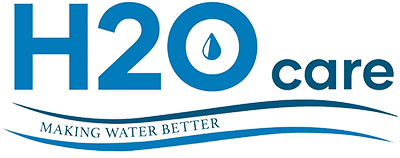Water purification is the process of removing undesirable chemicals, biological contaminants, and suspended solids and gases from water. The methods used include physical processes such as sediment filtration, carbon based filtration and sedimentation with sand filters. Also, chemical processes such as flocculation and chlorination and the use of ultraviolet light or ozone may be used.
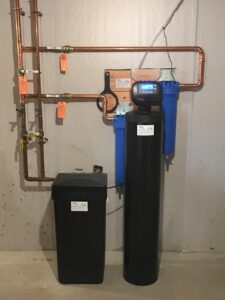
High Efficiency Water Softener
WATER PURIFICATION FOR YOUR HOME OR BUSINESS
Water purification systems can be installed for the removal of almost any of the potential water quality concerns you may have. For example, lead is typically removed from drinking water with either a reverse osmosis water purification system or a carbon filter designed specifically for the removal of lead. A water softener will remove hardness minerals as well as dissolved iron and manganese. To remove particulate iron or manganese, a properly sized sediment filter is required. Radon or arsenic in water requires other technologies and systems. Water testing will lead to the right system design & installation.
BAD ODORS & TASTES
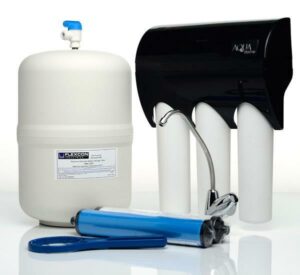
Reverse Osmosis Purification System
In addition to the above systems described, there are many other types of systems to remove bad tastes & odors, sediment and many other objectionable minerals and contaminants that may be present in the water. For more detailed information on bad odors and tastes in your water, see the link at: https://h2ocare.com/bad-odor-taste.
THE AFFECTS OF HARD WATER IN YOUR HOME
Hard water is defined by high magnesium & calcium. It interferes with many cleaning tasks, from doing the laundry to washing dishes to taking a shower. Additionally, washing your hair in hard water may leave it feeling sticky and dull. Dishes and glasses get spotted or streaky and a film may build up on shower doors, bathtubs, sinks and faucets. Clothes can look dingy and feel rough and scratchy. Not to mention, scale from hard water can build-up inside water heaters insulating the temperature sensor inside the tank. Consequently, this creates extra work to bring the temperature up to the set level. In following, this reduces the life of your hot water heater and may require early replacement. Hard water can also cause scale build-up in pipes that can lower water pressure throughout the home (see photo below).
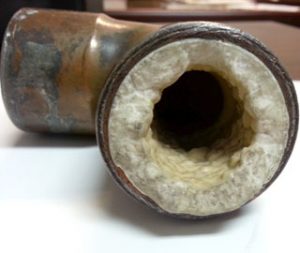
Damaging Scale
THE STAINERS, IRON AND MANGANESE
The primary hard water minerals are calcium and magnesium (the hardness minerals), while iron and manganese can also be found in water, mostly in private wells. Moreover, depending on whether the contaminant’s form is in solution or particulate, these contaminants can be removed with a water softener and/or a properly specified sediment water filtration installation.
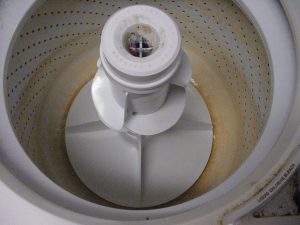
Dissolved Iron Staining
A water softener will improve your water greatly if you have hard water minerals, iron, or manganese in your water. Simultaneously, if other impurities are confirmed in the water test, they can be removed with other types of water filtration systems. The maximum allowable level (per the Environmental Protection Agency) for iron as a secondary contaminant is .3 parts per million. Also, for manganese the level is .05 parts per million. Small amounts of these minerals can have very noticeable, even damaging affects on your home’s water quality. For more on hard water, see hard water USGS.
Any water purification system recommendation should start with a water test before an informed decision can be made. In following, to determine what type of testing and how to take a proper sample, call a water treatment professional.
H2O Care is an established, Massachusetts based water filtration and testing firm, formed in 1989 with offices in Stow, Middleton & Lakeville, MA. Articles published by the Company can be seen in Water Technology Magazines at http://h2ocare.com/pub. Contact us at service@h2ocare.com or 978-777-8330.
